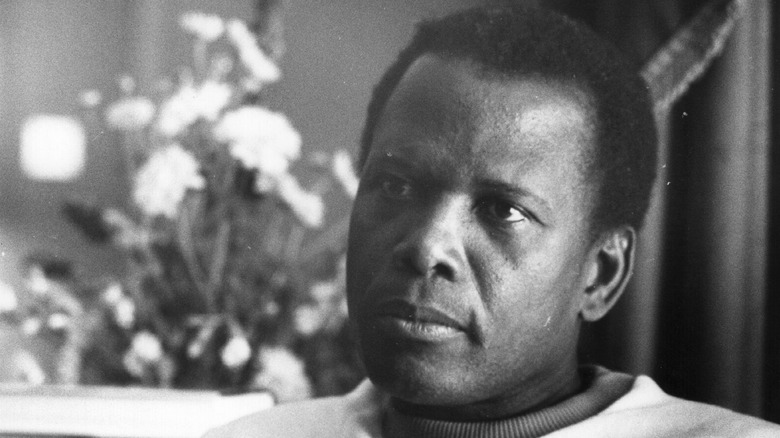The Heartbreaking Death Of Sidney Poitier
The Bahamian Minister of Foreign Affairs, Fred Mitchell, has announced that actor Sidney Poitier has died at the age of 94 (via Independent). A source close to the family confirmed the news to NBC.
Sidney Poitier became a film icon in the 1950s and was famously known by his family as the one who "knows how to make a room explode," via The Hollywood Reporter. The actor, director, and producer devoted his life to tearing down barriers in Hollywood, challenging audiences by discussing racial inequality onscreen and rejecting roles that played into racial stereotypes, per Britannica. He was also the first Black actor to win an Academy Award for best actor in 1953, and one of the first nationally-known Black movie stars.
However, Poitier once told Oprah that he didn't measure himself by his achievements, as nearly all of them are defined in terms of his race. Instead of being "confined by color," as Oprah stated, Poitier chose to embrace every aspect of his humanity. "The big picture is that racism has been an awful experience — but there are other experiences," he said. "We need to keep an eye on the other human experiences to give ourselves the fullness and the breadth of our own humanity."
Poitier also acknowledged that he chose the movie roles he did for a reason. "Every one of those pictures, with the exception of the two I mentioned earlier, came from filmmakers who had to make a comment that racism is wrong," he said. "There are people — black, white, blue, green — who find it necessary to make that kind of comment through their lives or professions. And I was a part of that mix."
Sidney Poitier's early life
Sidney Poitier was born in 1927 in Miami, Florida, and grew up in a small village in Cat Island in the Bahamas (via PBS). As Oprah notes, his parents worked as tomato farmers and struggled in extreme poverty. When he was 11, Poitier and his family moved to Nassau, the capital of the Bahamas, where Poitier had his first taste of the cinema, per PBS. Poitier became fascinated with it and soon developed a desire to pursue the arts.
When he turned 15, Poitier moved to Miami to live with his brother (via Oprah). However, he soon fled by bus to New York City with only three dollars to his name. He learned that he was being pursued by the Ku Klux Klan for delivering a package to the front of a house instead of to the back of a house (via Buffalo News Center). There in Manhattan, he was charged with vagrancy and briefly went to jail before living for a short time at an orphanage.
Poitier then lied about his age in order to join the U.S. Army. During his service, he worked as a psychotherapist with the 126th Medical Detachment and was discharged in 1944. After a few odd jobs, Poitier answered an ad for the American Negro Theater (via Oprah). Unfortunately, the director reportedly told him to stop wasting his time after he heard Poitier's thick Caribbean accent.
Sidney Poitier's transition from theater to film
The harsh words from the director of the American Negro Theater didn't deter Sidney Poitier, who worked to lose his Caribbean accent by mimicking American newscasters (via Oprah). He also took up a job as a janitor at the American Negro Theater in exchange for acting lessons. Before long, an opportunity arose. Poitier was tasked with understudying none other than Harry Belafonte in the play "Days of Our Youth," according to PBS. Belafonte called out sick one evening, and Poitier made his public debut.
Based on his successful performance, Poitier earned a small role in "Lysistrata," an ancient Greek comedy. He was reportedly nervous and uncertain of his lines, but won over the audience. Poitier's success in theater only grew from there, and in 1950, he made his film debut in "No Way Out," one of the first movies to directly discuss racial hatred. His performance turned him into a hero in the Bahamas, though the British colonial government there decided to censor the film.
Poitier continued to star in movies that addressed racism throughout the 1950s, including "Cry, the Beloved Country," an adaptation of a novel about apartheid in South Africa, and "Edge of the City," a story about a Black dockworker who befriends a white coworker. As told by Britannica, Poitier refused to accept roles that played into racial stereotypes, which challenged Hollywood and helped create opportunities for other Black actors.
Sidney Poitier's critically-acclaimed performances and awards
While Sidney Poitier became well-known for his film career, he didn't leave theater behind. He continued to appear in plays and in 1959, he landed the starring role in "A Raisin in the Sun" by Lorraine Hansberry (via Britannica). His performance earned him critical acclaim, and he went on to star in the show's screen adaptation.
In 1963, Poitier played the ex-GI, Homer Smith, in the film "Lilies of the Field." With his performance, he became the first Black actor to win an award for Best Actor, and the second to win an Academy Award (via History). He continued to take on roles that addressed racism throughout the 1970s, and in 1972, he made his directorial debut with the film "Buck and Preacher" (via Britannica). Though the movie didn't receive great box office ratings or reviews, subsequent films he directed were big hits, including "Stir Crazy" with Gene Wilder and Richard Pryor.
In 2001, Poitier received an honorary Academy Award in recognition of "his remarkable accomplishments as an artist and as a human being," per the Academy Award Acceptance Speech Database. "I arrived in Hollywood at the age of twenty-two in a time different than today's," he said in his acceptance speech. "Back then, no route had been established for where I was hoping to go ... Yet, here I am this evening at the end of a journey that in 1949 would have been considered almost impossible."
Sidney Poitier's personal life
In 1950, Sidney Poitier married model Juanita Hardy (via Biography and People). The couple had four daughters together: Beverly Poitier-Henderson, Pamela Poitier, Sherri Poitier and Gina Poitier. However, Poitier and Hardy got divorced in 1965, at which time the public learned he had been having an affair with actor Diahann Carroll, which lasted for nine years. In 1976, Poitier then married actor Joanna Shimkus (now Joanna Poitier), his co-star in the 1969 film "The Lost Man." The stars had two daughters together (pictured above with Joanna), Anika Poitier and Sydney Tamiia Poitier-Heartsong, and have been married ever since, as noted by Biography.
On Poitier's 90th birthday, he and his entire family got together to celebrate and take a family portrait, according to The Hollywood Reporter. Four generations posed for the photo, with Poitier front and center, enjoying the festivities. Unfortunately, his daughter Gina Poitier died a year after the photo was taken (via Northside Chapel).
"He is the most wonderful, generous, kind, honest man with the most integrity that I've ever known in my life," Joanna Poitier said. In addition to his five surviving children, ex-wife, and wife Joanna, Poitier is survived by eight grandchildren and three great-grandchildren (via NBC).




